2023年中考英语复习 八年级(下) Units 1-3课件(共49张PPT)
文档属性
| 名称 | 2023年中考英语复习 八年级(下) Units 1-3课件(共49张PPT) |  | |
| 格式 | ppt | ||
| 文件大小 | 2.2MB | ||
| 资源类型 | 教案 | ||
| 版本资源 | 人教新目标(Go for it)版 | ||
| 科目 | 英语 | ||
| 更新时间 | 2023-06-11 16:23:41 | ||
图片预览

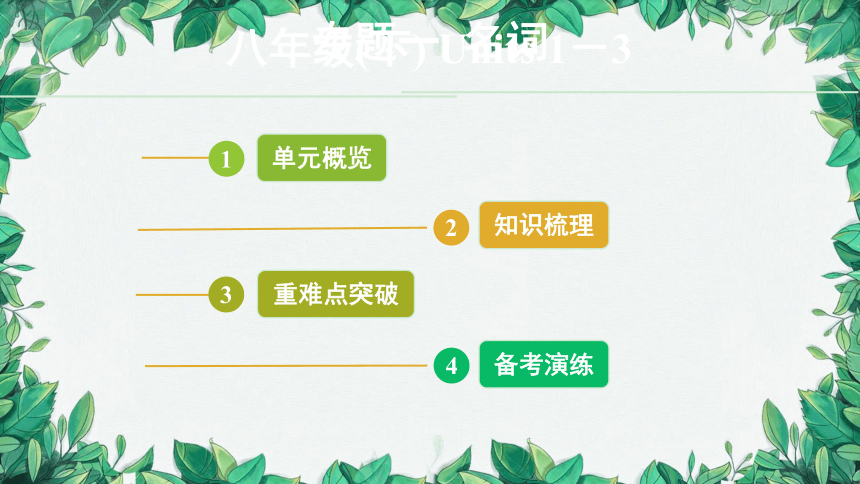

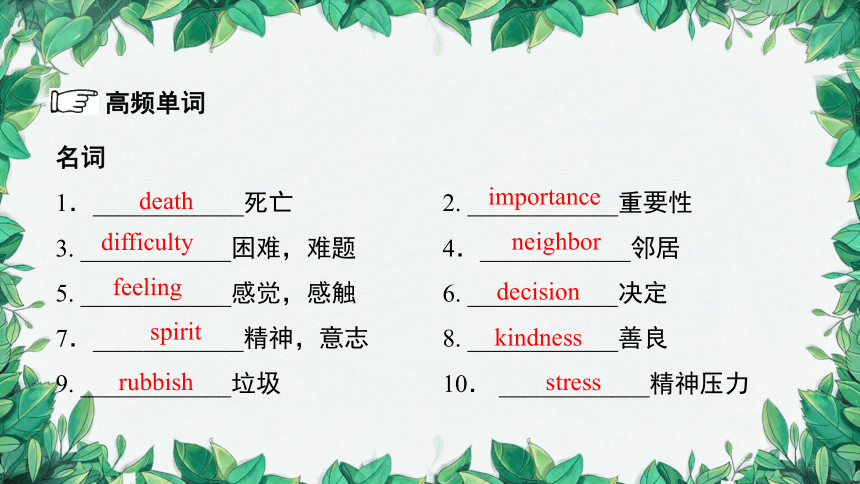
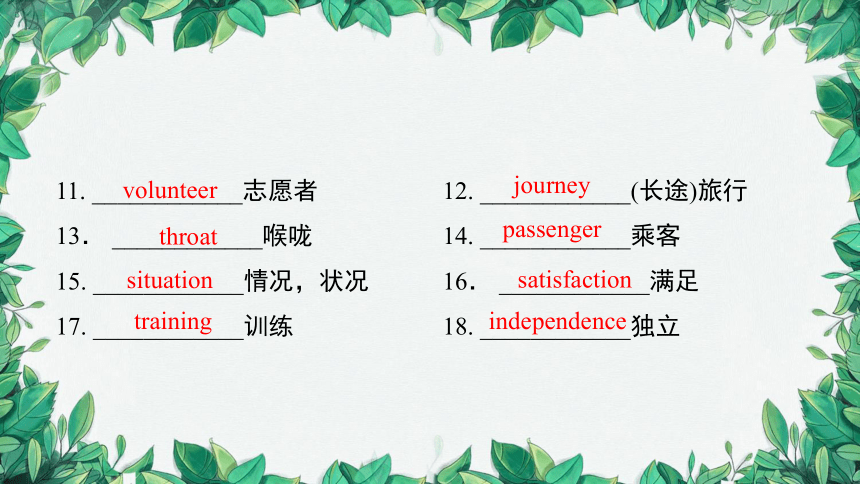
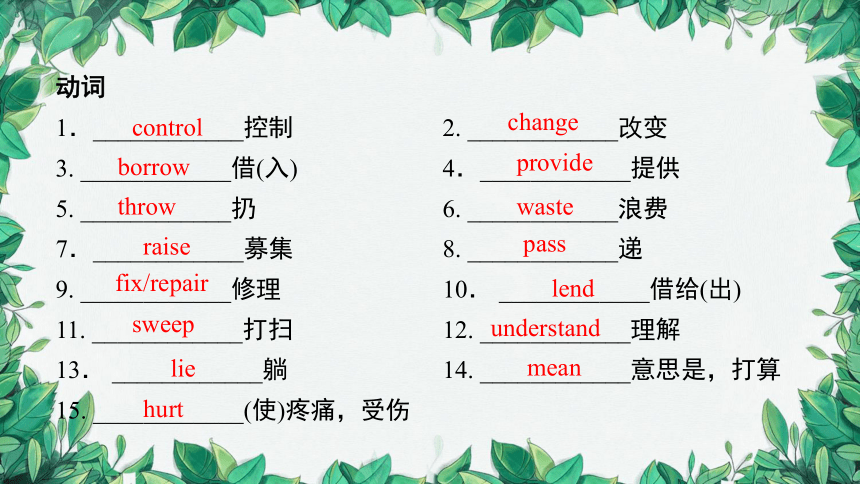
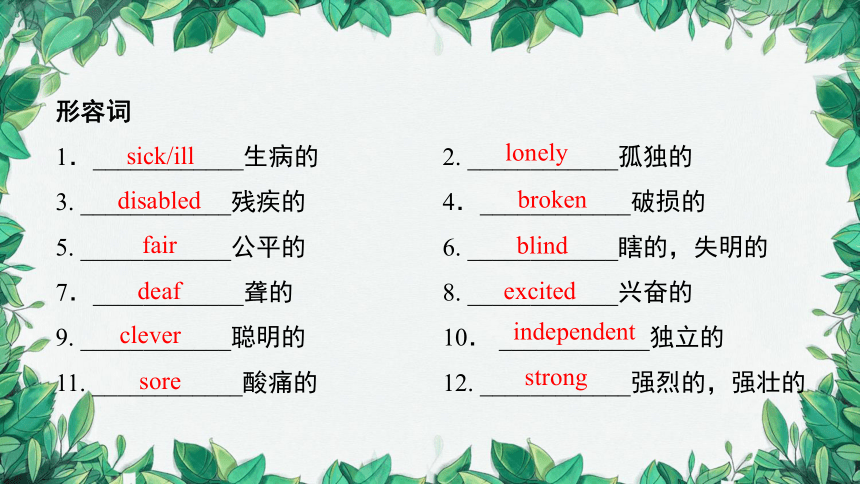
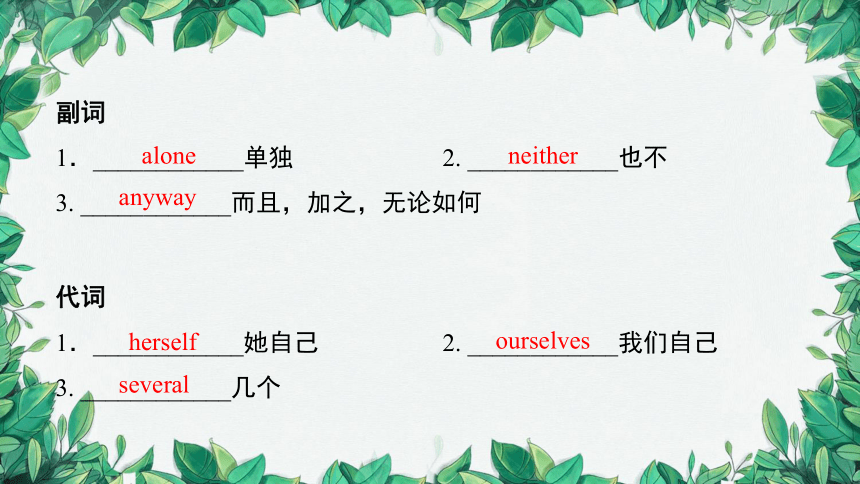
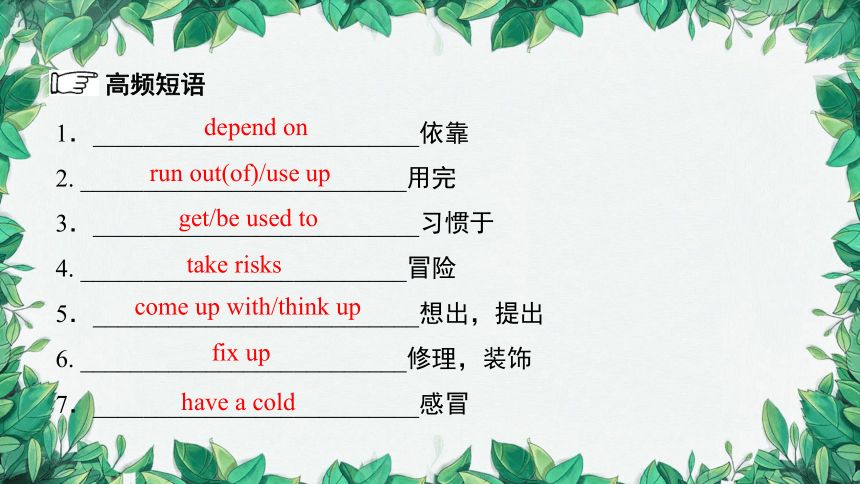

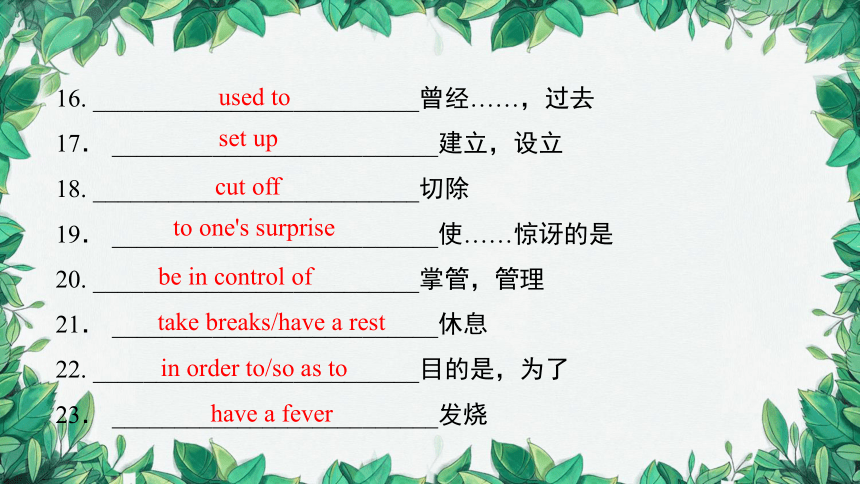

文档简介
(共49张PPT)
教材重难点梳理
专题一 名词
1
单元概览
2
知识梳理
3
重难点突破
4
备考演练
八年级(下) Units 1-3
单元 标题 话题 语法
1 What's the matter? 卫生与健康 1. should/shouldn't 表建议的用法
2.反身代词的用法
2 I'll help to clean up the city parks. 日常活动 动词不定式作宾语、宾补、目的状语的用法
3 Could you please clean your room? 日常活动 could表请求及允许的用法
名词
1.____________死亡 2. ____________重要性
3. ____________困难,难题 4.____________邻居
5. ____________感觉,感触 6. ____________决定
7.____________精神,意志 8. ____________善良
9. ____________垃圾 10. ____________精神压力
高频单词
death
importance
difficulty
neighbor
feeling
decision
spirit
kindness
rubbish
stress
11. ____________志愿者 12. ____________(长途)旅行 13. ____________喉咙 14. ____________乘客 15. ____________情况,状况 16. ____________满足 17. ____________训练 18. ____________独立
volunteer
journey
throat
passenger
situation
satisfaction
training
independence
动词
1.____________控制 2. ____________改变
3. ____________借(入) 4.____________提供
5. ____________扔 6. ____________浪费
7.____________募集 8. ____________递
9. ____________修理 10. ____________借给(出)
11. ____________打扫 12. ____________理解
13. ____________躺 14. ____________意思是,打算
15. ____________(使)疼痛,受伤
control
change
borrow
provide
throw
waste
raise
pass
fix/repair
lend
sweep
understand
lie
mean
hurt
形容词
1.____________生病的 2. ____________孤独的
3. ____________残疾的 4.____________破损的
5. ____________公平的 6. ____________瞎的,失明的
7.____________聋的 8. ____________兴奋的
9. ____________聪明的 10. ____________独立的
11. ____________酸痛的 12. ____________强烈的,强壮的
sick/ill
lonely
disabled
broken
fair
blind
deaf
excited
clever
independent
sore
strong
副词
1.____________单独 2. ____________也不
3. ____________而且,加之,无论如何
代词
1.____________她自己 2. ____________我们自己
3. ____________几个
alone
neither
anyway
herself
ourselves
several
1.__________________________依靠
2. __________________________用完
3.__________________________习惯于
4. __________________________冒险
5.__________________________想出,提出
6. __________________________修理,装饰
7.__________________________感冒
高频短语
depend on
run out(of)/use up
get/be used to
take risks
come up with/think up
fix up
have a cold
8. __________________________影响,有作用
9.__________________________一……就……
10. __________________________使振奋起来
11. __________________________躺下
12. __________________________分发
13. __________________________赠送,捐赠
14. __________________________放弃
15. __________________________推迟
make a difference
as soon as
cheer up
lie down
hand out/give out
give away
give up
put off
16. __________________________曾经……,过去
17. __________________________建立,设立
18. __________________________切除
19. __________________________使……惊讶的是
20. __________________________掌管,管理
21. __________________________休息
22. __________________________目的是,为了
23. __________________________发烧
used to
set up
cut off
to one's surprise
be in control of
take breaks/have a rest
in order to/so as to
have a fever
24. __________________________频繁,反复,总是
25. __________________________量体温
26. __________________________胃痛
27. __________________________下车
28. __________________________立即,马上
29. __________________________打扫
30. __________________________离开,从……出来
31. _____________________________照顾
all the time
take one's temperature
have a stomachache
get off
right away
clean up
get out of
take care of/look after/care for
32. __________________________打电话给某人,征召
33. __________________________参加……选拔
34. __________________________(外貌或行为)像
35. __________________________倒垃圾
36. __________________________陷入,参与
call up
try out
take after
take out the rubbish
get into
精彩段落
经典背诵(根据中文提示完成短文,然后背诵文章)
Aron Ralston is used to 1. _____________(冒险). There were many times when he almost lost his life 2. ____________(因为) accidents. On April 26,2003,his arm was caught under a 360 kilo rock that fell on him. When his water 3. ___________(用完),he used his knife to 4. _________(切除) his right arm. Then,with his left arm,he bandaged himself 5. __________________(以便于) he would not lose too much blood. After that,he climbed down the mountain to find help.
After losing his arm,he wrote a book called Between a Rock and a Hard Place. In this book,Aron tells of the importance of 6. __________________________(做出正确的决定),and of 7. _________________(掌管) one's life. His love for mountain climbing is 8. _______great________(如此……以致于……) he 9. ____________(继续) climbing mountains even after this experience.
taking risks
because of
ran out
cut off
so that/in order that
making good/correct decisions
being in control of
so
kept on
that
1.lie v.躺,撒谎,位于 n.谎言
He is lying on the bed. 他正躺在床上。
Don't lie to me. 不要对我撒谎。
He often tells lies. 他经常撒谎。
Zhanjiang lies in the south of China. 湛江位于中国的南部。
一词多义
2.notice n.通知 v.注意到
There is a notice on the board. 公告牌上有一则通知。
I noticed someone coming in. 我注意到有人进来了。
3.change v.改变 n.改变,零钱
I have changed a lot. 我变了许多。
Great changes have taken place in Guangxi. 广西发生了巨大的变化。
Here is your change. 这是找给你的零钱。
4.break v.打破(记录),弄坏 n.休息
He broke the world record again. 他又打破了世界记录。
The boy broke his neighbor's window with a stone.
这个男孩用石头砸坏了邻居的窗户。
We usually take a break at 10 o'clock. 我们通常10点休息。
5. rest v.休息 n.休息,剩余部分
You need to rest. 你需要休息。
The doctor advised him to take a rest. 医生建议他要休息。
She ate some of the cookies and put the rest on the table.
她吃了一些饼干,然后把剩余的放在了桌上。
6.matter n.事情,问题 v.事关紧要,要紧
What's the matter with you 你怎么啦?
It doesn't matter to me what you do. 你做什么我无所谓。
7.mean v.意思是,打算 adj. 吝啬的,刻薄的
What does the word mean 这个单词什么意思?
I didn't mean to hurt you. 我不是故意伤害你的。
He is mean with money. 他在钱方面吝啬。
The man is so mean to his children. 他对他的子女很刻薄。
8.raise v.募集,举起,增加,提高
I will raise some money for the poor. 我将会为穷人募集一些钱。
If you know the answer, raise your hand.
如果你知道答案,举起你的手。
The boss raised salaries for everyone in the company.
老板为公司里的每一个人都提高了薪水。
1.部位+ache:
tooth n.牙齿——toothache n.牙痛; head n.头——headache n.头痛; stomach n.胃,腹部——stomachache n.胃痛,腹痛
快乐家族
2.adj. →n. :
important adj. 重要的——importance n.重要性;
difficult adj. 困难的——difficulty n.困难
3.v. →adj. →n. :
(1)interest n.兴趣;v. 使感兴趣——interested adj. 感兴趣的——interesting adj. 有趣的
(2)decide v.决定——decision n.决定; satisfy v.使满足——satisfied adj. 满意的,满足的——satisfactory adj. 令人满意的——satisfaction n.满足,满意
(3)develop v.发展,壮大——developed adj. 发达的——developing adj. 发展中的——development n.发展
(4)excite v.使兴奋——excited adj. 兴奋的——exciting adj. 令人兴奋的——excitement n.兴奋
4.adj. →n. :
kind adj. 善良的——kindness n.善良; fair adj. 公平的———fairness n.公平——unfair adj. 不公平的——unfairness n.不公平
5.v. →n. :
train v.训练——training n.训练; feel v.感觉——feeling n.感受
1.because与because of的区别
because:连词,其后接原因状语从句或回答以why开头的问句。
because of:复合介词,其后接名词、代词或动名词,或者是以what引导的名词性从句。
(1)I didn't go hiking with my friends last weekend ______________ the heavy rain.
(2)I didn't go hiking with my friends last weekend _______________ it rained heavily.
because of
because
2.exciting与excited的区别
exciting:指某事物“令人兴奋,激动”,主语常是物。
excited:表示某人对某事物“感到兴奋,激动”,主语常是人。
be/get excited about sth. /doing sth. 意为“对……感到兴奋,激动”;be excited to do sth. 意为“做某事很兴奋”。
(1)It was such an ______________ basketball game that we all enjoyed it.
(2)Sarah felt really ____________ when she heard the ______________ news.
(3)I am/get excited about _______________to Beijing=I am excited to __________ to Beijing.
exciting
excited
exciting
going
go
3.run out of 与 run out 的区别
run out of:意为“用完,用尽”,主语通常是人,与use up意思相同;run out of 还可以表示“从……跑了出来”。
run out:意为“(时间,金钱,事物等)用尽,用完”,此时主语是物。
(1)He ____________________ all his money two days ago,so he had to borrow some from others.
(2)The chalk has ____________________.We need to get some from the teachers' office.
ran out of
run out
4.in time与 on time的区别
in time:意为“及时”,指的是不迟到或在提前的时间之前做某事。
on time:意为“准时”,指按规定的时间或指定的时间做某事。
(1)The firemen reached the house on fire ____________________ and they put out the fire quickly.
(2)As students,we need to get to school ____________________.
in time
on time
5.death,dead,die与dying的区别
death:意为“死,死亡”,抽象名词,只能在句中作主语或宾语。
dead:形容词,表状态,可以在句中作表语和定语。若表示“某人死了多长时间”,用“have/has been dead+for+时间段”。
die:意为不及物动词,意为“死”,是短暂性动词,不能和表示一段时间的状语(for+时间段或since+时间点)连用。
dying:die的现在分词,也可作形容词表示“垂死的,要死的”,常作定语。
(1)Her pet dog's ____________________ made her very sad.
(2)He's ____________________,but he will live in our hearts forever.
(3)The poor old man ____________________ one month ago.
(4)The doctor tries to save Jack's ____________________ wife.
death
dying
dead
died
6.thanks to 与 thanks for的区别
thanks to:意为“多亏了……”“由于……的帮助”,相当于because of… 或 with the help of…,在此短语中,to是一个介词,后接名词或代词。强调感谢的对象。
thanks for=thank you for:意为“因为……而感谢”,强调感谢的原因,后接名词或动名词。
(1)_______________ the Internet, we can do all our shopping from home.
(2)____________________ asking me to the party. I really had fun at it.
Thanks to
Thanks for
7.borrow,lend,keep的区别
borrow:表示“借入”,即说话人向别人借东西供自己用,常用结构 borrow sth. from…。
lend(lent lent):表示“借出”,即说话人把自己的东西借给别人用,常用结构lend sb. sth. 或 lend sth. to sb. 。
keep(kept kept):本意为“保存,保留”,引申为“借用”,可以和一段时间及how long 等连用。
borrow 和lend是短暂性动词,不能与表示延续性的时间状语连用。
(1)I can't _____________ the bike to you because I ______________ it from someone else.
(2)—How long can I _____________ this book
—For two weeks.
keep
lend
borrowed
8.pass与past的区别
pass:动词,有“经过、通过、传递”等意思。pass sb. sth. =pass sth. to sb. 把某东西递给某人。
past:形容词,意为“过去的”;介词,意为“经过,过……”go past/walk past=pass(by);名词,意为“过去,往事(与the连用)。in the past意为“在过去”,in the past…years 意为“在过去的……年里”。
(1)Excuse me, could you please ____________________ me the salt
(2)I walked__________________ the shoe store on my way to the library.
pass
past
9.provide与offer的区别
provide:动词,意为“提供,供应,供给”,常用短语:provide sb. with sth. 或 provide sth. for sb. 意为“为某人提供某物”。
offer:动词,意为“提供,给予”,常用短语:offer to do sth. 意为“(主动提出)做某事”,offer sb. sth. 或 offer sth. to sb. 意为“向某人提供某物”。
(1)He ____________________ to help me carry the heavy box.
(2)The government ____________________ lots of food and clothes for the homeless people after the earthquake.
offered/offers
provided
10.important与importance的区别
important:形容词,意为“重要的”
importance:名词,意为“重要性”,常用短语:the importance of sth.
(1)Everyone should realize the ____________________ of protecting the environment.
(2)It is ____________________ to keep healthy.
importance
important
11.The earlier kids learn to be independent,the better it is for their future.
“the+比较级……,the+比较级……”的句型,是比较级的一种用法。表示“越……,就越……”。
Many people believe that the ____________________ books a person reads, the ____________________ he will become.
more
wiser/smarter/cleverer
12.She did not do any housework. Neither did I./She went fishing last weekend. So did I.
倒装句“So…sb. ”与“Neither…sb. ”的用法。
“So+助动词+sb. ”意为“某人也这样”,相当于“sb. too. ”;“Neither+助动词+sb. ”意为“某人也不”,相当于“sb. neither. ” 这两个句子的助动词,要与前面句子所属时态的助动词一致。
(1)She has finished homework. ____________________ I.
(2)She didn't go to the party. ____________________ I.
So have
Neither did
13.反身代词的构成及用法
当主语和宾语指的是同一个人或物时,宾语用反身代词。
enjoy oneself/doing sth. 玩得开心 by oneself 独自
for oneself 亲自 help oneself to 随便吃,随便用
say to oneself 心里想,自言自语 hurt oneself 伤到某人自己
teach oneself sth. =learn sth. by oneself 自学……
come to oneself 醒来
(1)As teenagers,we should do our own things by ______________.
(2)They went to the museum yesterday and enjoyed ______________.
ourselves
themselves
一、语法选择。(建议用时: 7分钟)
When I was ten years old, I went to the USA with my mom. I can still __1__ the first Halloween holiday I had in the USA.
On the morning of Halloween, our class paid a visit to a pumpkin farm. __2__ of us brought a pumpkin to school. I used the pumpkin to make a lantern which had two triangle(三角形) eyes and a scary mouth.
( )1. A. remember B.remembered C.remembering
( )2. A. Both B.Each C.Every
A
B
In the afternoon, we __3__ the Halloween costumes and went on parade in school. Some of the costumes were nice, __4__ some of them looked scary. I chose to wear a suit of Superman's clothes.
I did a lot of __5__ that day, but the part I liked best was “trick or treat” in the evening.
( )3. A. wear B.wore C.were wearing
( )4. A. so B.though C.but
( )5. A. a thing B.thing C.things
B
C
C
After dinner, I went outside __6__ an empty bag. I hoped to get a lot of candies from people.
At first, I was a bit nervous, so when I knocked at the door, my heart was __7__ very fast. A chubby(圆胖的) lady came out, and I said carefully to her, “Trick or treat”.My voice was so low that I couldn't hear it myself .
( )6. A. by B.in C.with
( )7. A. beat B.beating C.beats
C
B
To my surprise, the lady was so __8__ that she gave me two candy bars, and I thanked the lady __9__ and moved on. I couldn't remember how many houses I visited, but I could remember how many candies I got—I got 91 pieces of candy that day.
What __10__ happy Halloween I had! And I wish we could have a Halloween every month.
( )8. A. kindly B.kindness C.kind
( )9. A. cheered B.cheerful C.cheerfully
( )10. A. a B.an C.the
C
C
A
二、短文填空。(建议用时: 8分钟)
One day, a woman walked into a pet store. She wanted to buy a bird __11__ her Thanksgiving Day party. The store owner said, “We only have one parrot, but it talks…” The woman said, “I just want to __12__ a talking bird. __13__ great it will be if I have one!”
The lady bought it at a low __14__. After she went back home, she put the bird on her table and __15__ out of the room.
11. 12. 13. 14. 15. ..
for
buy
How
price
walked/went
But as soon as she went into the kitchen, __16__ bird started to speak dirty words as loudly as it could. It was very impolite. The woman walked back into the room and thought carefully. “I can't have this parrot at my party!” So she took the bird away and put it in the __17__.
A few hours later, while the woman was eating cheese, she remembered that her parrot was still in the fridge. Quickly, she opened the door __18__ found it was shivering(发抖).
16. 17. 18. .
the
fridge
and
She said to the bird, “I will keep you out of here if you don't use that language again. ” The bird nodded and __19__ a promise to her. “Can I just ask a quick question?”it asked in a much __20__ way than before, then the bird pointed at the frozen(冻僵的) turkey behind him and asked. “What did he do?”
19. 20. .
made
politer
三、小作文操练。
请根据下面的信息, 用4~6句话写一篇你申请做志愿者的小短文。
内容包括:1. 你想什么时间去什么地方做志愿者,及选择去那里的原因。
2.如果申请成功你将会做什么。
Dear sir,
Thanks for reading my letter. _______________________________
_______________________________________________________________________________________________________________________________________________________________________________________________________________________________________________________________________________________________________
Yours,
Anna
I'd like to be a volunteer in your school to help the kids this summer.
I'm good at painting and singing. What's more, I love the kids and can get on well with them. So if I'm lucky enough to help out in your school, I can teach kids to paint and sing. I will be very glad if I can be one of the volunteers.
教材重难点梳理
专题一 名词
1
单元概览
2
知识梳理
3
重难点突破
4
备考演练
八年级(下) Units 1-3
单元 标题 话题 语法
1 What's the matter? 卫生与健康 1. should/shouldn't 表建议的用法
2.反身代词的用法
2 I'll help to clean up the city parks. 日常活动 动词不定式作宾语、宾补、目的状语的用法
3 Could you please clean your room? 日常活动 could表请求及允许的用法
名词
1.____________死亡 2. ____________重要性
3. ____________困难,难题 4.____________邻居
5. ____________感觉,感触 6. ____________决定
7.____________精神,意志 8. ____________善良
9. ____________垃圾 10. ____________精神压力
高频单词
death
importance
difficulty
neighbor
feeling
decision
spirit
kindness
rubbish
stress
11. ____________志愿者 12. ____________(长途)旅行 13. ____________喉咙 14. ____________乘客 15. ____________情况,状况 16. ____________满足 17. ____________训练 18. ____________独立
volunteer
journey
throat
passenger
situation
satisfaction
training
independence
动词
1.____________控制 2. ____________改变
3. ____________借(入) 4.____________提供
5. ____________扔 6. ____________浪费
7.____________募集 8. ____________递
9. ____________修理 10. ____________借给(出)
11. ____________打扫 12. ____________理解
13. ____________躺 14. ____________意思是,打算
15. ____________(使)疼痛,受伤
control
change
borrow
provide
throw
waste
raise
pass
fix/repair
lend
sweep
understand
lie
mean
hurt
形容词
1.____________生病的 2. ____________孤独的
3. ____________残疾的 4.____________破损的
5. ____________公平的 6. ____________瞎的,失明的
7.____________聋的 8. ____________兴奋的
9. ____________聪明的 10. ____________独立的
11. ____________酸痛的 12. ____________强烈的,强壮的
sick/ill
lonely
disabled
broken
fair
blind
deaf
excited
clever
independent
sore
strong
副词
1.____________单独 2. ____________也不
3. ____________而且,加之,无论如何
代词
1.____________她自己 2. ____________我们自己
3. ____________几个
alone
neither
anyway
herself
ourselves
several
1.__________________________依靠
2. __________________________用完
3.__________________________习惯于
4. __________________________冒险
5.__________________________想出,提出
6. __________________________修理,装饰
7.__________________________感冒
高频短语
depend on
run out(of)/use up
get/be used to
take risks
come up with/think up
fix up
have a cold
8. __________________________影响,有作用
9.__________________________一……就……
10. __________________________使振奋起来
11. __________________________躺下
12. __________________________分发
13. __________________________赠送,捐赠
14. __________________________放弃
15. __________________________推迟
make a difference
as soon as
cheer up
lie down
hand out/give out
give away
give up
put off
16. __________________________曾经……,过去
17. __________________________建立,设立
18. __________________________切除
19. __________________________使……惊讶的是
20. __________________________掌管,管理
21. __________________________休息
22. __________________________目的是,为了
23. __________________________发烧
used to
set up
cut off
to one's surprise
be in control of
take breaks/have a rest
in order to/so as to
have a fever
24. __________________________频繁,反复,总是
25. __________________________量体温
26. __________________________胃痛
27. __________________________下车
28. __________________________立即,马上
29. __________________________打扫
30. __________________________离开,从……出来
31. _____________________________照顾
all the time
take one's temperature
have a stomachache
get off
right away
clean up
get out of
take care of/look after/care for
32. __________________________打电话给某人,征召
33. __________________________参加……选拔
34. __________________________(外貌或行为)像
35. __________________________倒垃圾
36. __________________________陷入,参与
call up
try out
take after
take out the rubbish
get into
精彩段落
经典背诵(根据中文提示完成短文,然后背诵文章)
Aron Ralston is used to 1. _____________(冒险). There were many times when he almost lost his life 2. ____________(因为) accidents. On April 26,2003,his arm was caught under a 360 kilo rock that fell on him. When his water 3. ___________(用完),he used his knife to 4. _________(切除) his right arm. Then,with his left arm,he bandaged himself 5. __________________(以便于) he would not lose too much blood. After that,he climbed down the mountain to find help.
After losing his arm,he wrote a book called Between a Rock and a Hard Place. In this book,Aron tells of the importance of 6. __________________________(做出正确的决定),and of 7. _________________(掌管) one's life. His love for mountain climbing is 8. _______great________(如此……以致于……) he 9. ____________(继续) climbing mountains even after this experience.
taking risks
because of
ran out
cut off
so that/in order that
making good/correct decisions
being in control of
so
kept on
that
1.lie v.躺,撒谎,位于 n.谎言
He is lying on the bed. 他正躺在床上。
Don't lie to me. 不要对我撒谎。
He often tells lies. 他经常撒谎。
Zhanjiang lies in the south of China. 湛江位于中国的南部。
一词多义
2.notice n.通知 v.注意到
There is a notice on the board. 公告牌上有一则通知。
I noticed someone coming in. 我注意到有人进来了。
3.change v.改变 n.改变,零钱
I have changed a lot. 我变了许多。
Great changes have taken place in Guangxi. 广西发生了巨大的变化。
Here is your change. 这是找给你的零钱。
4.break v.打破(记录),弄坏 n.休息
He broke the world record again. 他又打破了世界记录。
The boy broke his neighbor's window with a stone.
这个男孩用石头砸坏了邻居的窗户。
We usually take a break at 10 o'clock. 我们通常10点休息。
5. rest v.休息 n.休息,剩余部分
You need to rest. 你需要休息。
The doctor advised him to take a rest. 医生建议他要休息。
She ate some of the cookies and put the rest on the table.
她吃了一些饼干,然后把剩余的放在了桌上。
6.matter n.事情,问题 v.事关紧要,要紧
What's the matter with you 你怎么啦?
It doesn't matter to me what you do. 你做什么我无所谓。
7.mean v.意思是,打算 adj. 吝啬的,刻薄的
What does the word mean 这个单词什么意思?
I didn't mean to hurt you. 我不是故意伤害你的。
He is mean with money. 他在钱方面吝啬。
The man is so mean to his children. 他对他的子女很刻薄。
8.raise v.募集,举起,增加,提高
I will raise some money for the poor. 我将会为穷人募集一些钱。
If you know the answer, raise your hand.
如果你知道答案,举起你的手。
The boss raised salaries for everyone in the company.
老板为公司里的每一个人都提高了薪水。
1.部位+ache:
tooth n.牙齿——toothache n.牙痛; head n.头——headache n.头痛; stomach n.胃,腹部——stomachache n.胃痛,腹痛
快乐家族
2.adj. →n. :
important adj. 重要的——importance n.重要性;
difficult adj. 困难的——difficulty n.困难
3.v. →adj. →n. :
(1)interest n.兴趣;v. 使感兴趣——interested adj. 感兴趣的——interesting adj. 有趣的
(2)decide v.决定——decision n.决定; satisfy v.使满足——satisfied adj. 满意的,满足的——satisfactory adj. 令人满意的——satisfaction n.满足,满意
(3)develop v.发展,壮大——developed adj. 发达的——developing adj. 发展中的——development n.发展
(4)excite v.使兴奋——excited adj. 兴奋的——exciting adj. 令人兴奋的——excitement n.兴奋
4.adj. →n. :
kind adj. 善良的——kindness n.善良; fair adj. 公平的———fairness n.公平——unfair adj. 不公平的——unfairness n.不公平
5.v. →n. :
train v.训练——training n.训练; feel v.感觉——feeling n.感受
1.because与because of的区别
because:连词,其后接原因状语从句或回答以why开头的问句。
because of:复合介词,其后接名词、代词或动名词,或者是以what引导的名词性从句。
(1)I didn't go hiking with my friends last weekend ______________ the heavy rain.
(2)I didn't go hiking with my friends last weekend _______________ it rained heavily.
because of
because
2.exciting与excited的区别
exciting:指某事物“令人兴奋,激动”,主语常是物。
excited:表示某人对某事物“感到兴奋,激动”,主语常是人。
be/get excited about sth. /doing sth. 意为“对……感到兴奋,激动”;be excited to do sth. 意为“做某事很兴奋”。
(1)It was such an ______________ basketball game that we all enjoyed it.
(2)Sarah felt really ____________ when she heard the ______________ news.
(3)I am/get excited about _______________to Beijing=I am excited to __________ to Beijing.
exciting
excited
exciting
going
go
3.run out of 与 run out 的区别
run out of:意为“用完,用尽”,主语通常是人,与use up意思相同;run out of 还可以表示“从……跑了出来”。
run out:意为“(时间,金钱,事物等)用尽,用完”,此时主语是物。
(1)He ____________________ all his money two days ago,so he had to borrow some from others.
(2)The chalk has ____________________.We need to get some from the teachers' office.
ran out of
run out
4.in time与 on time的区别
in time:意为“及时”,指的是不迟到或在提前的时间之前做某事。
on time:意为“准时”,指按规定的时间或指定的时间做某事。
(1)The firemen reached the house on fire ____________________ and they put out the fire quickly.
(2)As students,we need to get to school ____________________.
in time
on time
5.death,dead,die与dying的区别
death:意为“死,死亡”,抽象名词,只能在句中作主语或宾语。
dead:形容词,表状态,可以在句中作表语和定语。若表示“某人死了多长时间”,用“have/has been dead+for+时间段”。
die:意为不及物动词,意为“死”,是短暂性动词,不能和表示一段时间的状语(for+时间段或since+时间点)连用。
dying:die的现在分词,也可作形容词表示“垂死的,要死的”,常作定语。
(1)Her pet dog's ____________________ made her very sad.
(2)He's ____________________,but he will live in our hearts forever.
(3)The poor old man ____________________ one month ago.
(4)The doctor tries to save Jack's ____________________ wife.
death
dying
dead
died
6.thanks to 与 thanks for的区别
thanks to:意为“多亏了……”“由于……的帮助”,相当于because of… 或 with the help of…,在此短语中,to是一个介词,后接名词或代词。强调感谢的对象。
thanks for=thank you for:意为“因为……而感谢”,强调感谢的原因,后接名词或动名词。
(1)_______________ the Internet, we can do all our shopping from home.
(2)____________________ asking me to the party. I really had fun at it.
Thanks to
Thanks for
7.borrow,lend,keep的区别
borrow:表示“借入”,即说话人向别人借东西供自己用,常用结构 borrow sth. from…。
lend(lent lent):表示“借出”,即说话人把自己的东西借给别人用,常用结构lend sb. sth. 或 lend sth. to sb. 。
keep(kept kept):本意为“保存,保留”,引申为“借用”,可以和一段时间及how long 等连用。
borrow 和lend是短暂性动词,不能与表示延续性的时间状语连用。
(1)I can't _____________ the bike to you because I ______________ it from someone else.
(2)—How long can I _____________ this book
—For two weeks.
keep
lend
borrowed
8.pass与past的区别
pass:动词,有“经过、通过、传递”等意思。pass sb. sth. =pass sth. to sb. 把某东西递给某人。
past:形容词,意为“过去的”;介词,意为“经过,过……”go past/walk past=pass(by);名词,意为“过去,往事(与the连用)。in the past意为“在过去”,in the past…years 意为“在过去的……年里”。
(1)Excuse me, could you please ____________________ me the salt
(2)I walked__________________ the shoe store on my way to the library.
pass
past
9.provide与offer的区别
provide:动词,意为“提供,供应,供给”,常用短语:provide sb. with sth. 或 provide sth. for sb. 意为“为某人提供某物”。
offer:动词,意为“提供,给予”,常用短语:offer to do sth. 意为“(主动提出)做某事”,offer sb. sth. 或 offer sth. to sb. 意为“向某人提供某物”。
(1)He ____________________ to help me carry the heavy box.
(2)The government ____________________ lots of food and clothes for the homeless people after the earthquake.
offered/offers
provided
10.important与importance的区别
important:形容词,意为“重要的”
importance:名词,意为“重要性”,常用短语:the importance of sth.
(1)Everyone should realize the ____________________ of protecting the environment.
(2)It is ____________________ to keep healthy.
importance
important
11.The earlier kids learn to be independent,the better it is for their future.
“the+比较级……,the+比较级……”的句型,是比较级的一种用法。表示“越……,就越……”。
Many people believe that the ____________________ books a person reads, the ____________________ he will become.
more
wiser/smarter/cleverer
12.She did not do any housework. Neither did I./She went fishing last weekend. So did I.
倒装句“So…sb. ”与“Neither…sb. ”的用法。
“So+助动词+sb. ”意为“某人也这样”,相当于“sb. too. ”;“Neither+助动词+sb. ”意为“某人也不”,相当于“sb. neither. ” 这两个句子的助动词,要与前面句子所属时态的助动词一致。
(1)She has finished homework. ____________________ I.
(2)She didn't go to the party. ____________________ I.
So have
Neither did
13.反身代词的构成及用法
当主语和宾语指的是同一个人或物时,宾语用反身代词。
enjoy oneself/doing sth. 玩得开心 by oneself 独自
for oneself 亲自 help oneself to 随便吃,随便用
say to oneself 心里想,自言自语 hurt oneself 伤到某人自己
teach oneself sth. =learn sth. by oneself 自学……
come to oneself 醒来
(1)As teenagers,we should do our own things by ______________.
(2)They went to the museum yesterday and enjoyed ______________.
ourselves
themselves
一、语法选择。(建议用时: 7分钟)
When I was ten years old, I went to the USA with my mom. I can still __1__ the first Halloween holiday I had in the USA.
On the morning of Halloween, our class paid a visit to a pumpkin farm. __2__ of us brought a pumpkin to school. I used the pumpkin to make a lantern which had two triangle(三角形) eyes and a scary mouth.
( )1. A. remember B.remembered C.remembering
( )2. A. Both B.Each C.Every
A
B
In the afternoon, we __3__ the Halloween costumes and went on parade in school. Some of the costumes were nice, __4__ some of them looked scary. I chose to wear a suit of Superman's clothes.
I did a lot of __5__ that day, but the part I liked best was “trick or treat” in the evening.
( )3. A. wear B.wore C.were wearing
( )4. A. so B.though C.but
( )5. A. a thing B.thing C.things
B
C
C
After dinner, I went outside __6__ an empty bag. I hoped to get a lot of candies from people.
At first, I was a bit nervous, so when I knocked at the door, my heart was __7__ very fast. A chubby(圆胖的) lady came out, and I said carefully to her, “Trick or treat”.My voice was so low that I couldn't hear it myself .
( )6. A. by B.in C.with
( )7. A. beat B.beating C.beats
C
B
To my surprise, the lady was so __8__ that she gave me two candy bars, and I thanked the lady __9__ and moved on. I couldn't remember how many houses I visited, but I could remember how many candies I got—I got 91 pieces of candy that day.
What __10__ happy Halloween I had! And I wish we could have a Halloween every month.
( )8. A. kindly B.kindness C.kind
( )9. A. cheered B.cheerful C.cheerfully
( )10. A. a B.an C.the
C
C
A
二、短文填空。(建议用时: 8分钟)
One day, a woman walked into a pet store. She wanted to buy a bird __11__ her Thanksgiving Day party. The store owner said, “We only have one parrot, but it talks…” The woman said, “I just want to __12__ a talking bird. __13__ great it will be if I have one!”
The lady bought it at a low __14__. After she went back home, she put the bird on her table and __15__ out of the room.
11. 12. 13. 14. 15. ..
for
buy
How
price
walked/went
But as soon as she went into the kitchen, __16__ bird started to speak dirty words as loudly as it could. It was very impolite. The woman walked back into the room and thought carefully. “I can't have this parrot at my party!” So she took the bird away and put it in the __17__.
A few hours later, while the woman was eating cheese, she remembered that her parrot was still in the fridge. Quickly, she opened the door __18__ found it was shivering(发抖).
16. 17. 18. .
the
fridge
and
She said to the bird, “I will keep you out of here if you don't use that language again. ” The bird nodded and __19__ a promise to her. “Can I just ask a quick question?”it asked in a much __20__ way than before, then the bird pointed at the frozen(冻僵的) turkey behind him and asked. “What did he do?”
19. 20. .
made
politer
三、小作文操练。
请根据下面的信息, 用4~6句话写一篇你申请做志愿者的小短文。
内容包括:1. 你想什么时间去什么地方做志愿者,及选择去那里的原因。
2.如果申请成功你将会做什么。
Dear sir,
Thanks for reading my letter. _______________________________
_______________________________________________________________________________________________________________________________________________________________________________________________________________________________________________________________________________________________________
Yours,
Anna
I'd like to be a volunteer in your school to help the kids this summer.
I'm good at painting and singing. What's more, I love the kids and can get on well with them. So if I'm lucky enough to help out in your school, I can teach kids to paint and sing. I will be very glad if I can be one of the volunteers.
